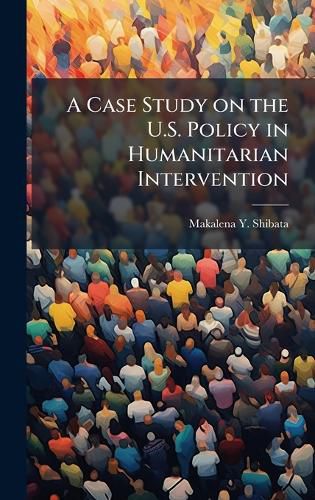Readings Newsletter
Become a Readings Member to make your shopping experience even easier.
Sign in or sign up for free!
You’re not far away from qualifying for FREE standard shipping within Australia
You’ve qualified for FREE standard shipping within Australia
The cart is loading…






This title is printed to order. This book may have been self-published. If so, we cannot guarantee the quality of the content. In the main most books will have gone through the editing process however some may not. We therefore suggest that you be aware of this before ordering this book. If in doubt check either the author or publisher’s details as we are unable to accept any returns unless they are faulty. Please contact us if you have any questions.
In the past 16 years, the U.S. has intervened militarily in approximately 20 crises ranging from feeding the Kurds in Iraq in 1990 to ousting a corrupt regime from Haiti in 2004. Given the current international security environment, it is likely that the U.S. will continue to intervene militarily in non-permissive environments to provide humanitarian assistance. Therefore, theU.S. must develop a current policy to address such why, when, and how the U.S. will participate in such operations. Analysis of case studies of humanitarian intervention (HI) in Somalia, Rwanda, and Liberia provides lessons learned to identify the conditions for U.S. participation and to shape the policy necessary for those participations. Although many lessons can be learned from analyzing these case studies, this paper addresses only those lessons crucial to developing a coherent HI policy. Lessons include ensuring a linkage to national interests and security, ensuring the HI addresses the root-cause of the conflict, accepting that HI risks American lives, and ensuring the appropriate allocation of national resources. Finally, the paper provides six recommendations in developing a coherent HI policy.
This work has been selected by scholars as being culturally important, and is part of the knowledge base of civilization as we know it. This work was reproduced from the original artifact, and remains as true to the original work as possible. Therefore, you will see the original copyright references, library stamps (as most of these works have been housed in our most important libraries around the world), and other notations in the work.
This work is in the public domain in the United States of America, and possibly other nations. Within the United States, you may freely copy and distribute this work, as no entity (individual or corporate) has a copyright on the body of the work.
As a reproduction of a historical artifact, this work may contain missing or blurred pages, poor pictures, errant marks, etc. Scholars believe, and we concur, that this work is important enough to be preserved, reproduced, and made generally available to the public. We appreciate your support of the preservation process, and thank you for being an important part of keeping this knowledge alive and relevant.
$9.00 standard shipping within Australia
FREE standard shipping within Australia for orders over $100.00
Express & International shipping calculated at checkout
Stock availability can be subject to change without notice. We recommend calling the shop or contacting our online team to check availability of low stock items. Please see our Shopping Online page for more details.
This title is printed to order. This book may have been self-published. If so, we cannot guarantee the quality of the content. In the main most books will have gone through the editing process however some may not. We therefore suggest that you be aware of this before ordering this book. If in doubt check either the author or publisher’s details as we are unable to accept any returns unless they are faulty. Please contact us if you have any questions.
In the past 16 years, the U.S. has intervened militarily in approximately 20 crises ranging from feeding the Kurds in Iraq in 1990 to ousting a corrupt regime from Haiti in 2004. Given the current international security environment, it is likely that the U.S. will continue to intervene militarily in non-permissive environments to provide humanitarian assistance. Therefore, theU.S. must develop a current policy to address such why, when, and how the U.S. will participate in such operations. Analysis of case studies of humanitarian intervention (HI) in Somalia, Rwanda, and Liberia provides lessons learned to identify the conditions for U.S. participation and to shape the policy necessary for those participations. Although many lessons can be learned from analyzing these case studies, this paper addresses only those lessons crucial to developing a coherent HI policy. Lessons include ensuring a linkage to national interests and security, ensuring the HI addresses the root-cause of the conflict, accepting that HI risks American lives, and ensuring the appropriate allocation of national resources. Finally, the paper provides six recommendations in developing a coherent HI policy.
This work has been selected by scholars as being culturally important, and is part of the knowledge base of civilization as we know it. This work was reproduced from the original artifact, and remains as true to the original work as possible. Therefore, you will see the original copyright references, library stamps (as most of these works have been housed in our most important libraries around the world), and other notations in the work.
This work is in the public domain in the United States of America, and possibly other nations. Within the United States, you may freely copy and distribute this work, as no entity (individual or corporate) has a copyright on the body of the work.
As a reproduction of a historical artifact, this work may contain missing or blurred pages, poor pictures, errant marks, etc. Scholars believe, and we concur, that this work is important enough to be preserved, reproduced, and made generally available to the public. We appreciate your support of the preservation process, and thank you for being an important part of keeping this knowledge alive and relevant.